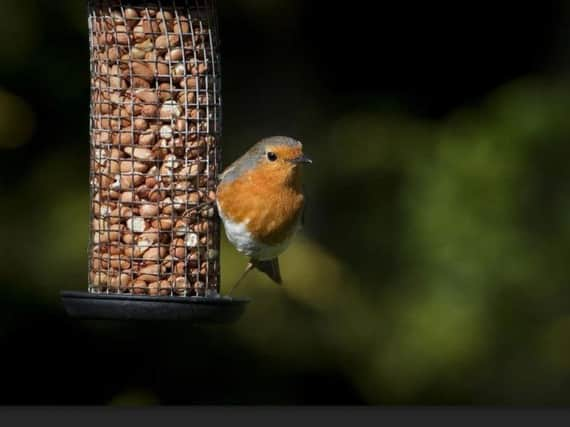FOOD FOR THOUGHT: Bird feeders that attract crows could spell bad news for robin red breasts


In areas of lots of feeders and crows less than one-per-cent of robin nests survive 28 days to fledging. But, in areas with fewer feeders and crows, up to 34 per cent of robin nests survive.
Tables and feeders attract not only favourite garden visitors but predators that eat eggs and nestlings. But birds of prey may also feed on the abundance of seeds and nuts so are less likely to target nests.
Advertisement
Hide AdAdvertisement
Hide AdA four-year-long study looked at whether putting up artificial feed stations was harmful to songbirds. Researchers said, while robins suffered on balance, putting out feeders was still a good thing for other bird species.
The study tracked "complex" relationships between the success of robin and other nests, presence of potential predators like squirrels, domestic cats and other birds as well as presence of bird feeders in the area.
Associate wildlife biologist Dr Jennifer Malpass said: "We found evidence that supplementary food has the potential to increase relative abundance of certain predators, but not necessarily in a way that raises risk of nest predation.
"Our results show supplementary food does not necessarily increase risk of predation for breeding birds but instead likely has nuanced and species-specific consequences."
Advertisement
Hide AdAdvertisement
Hide AdResults suggested "the nest survival of robins declined with higher numbers of bird feeders only where relative abundance of crows was highest, which suggests crows may have been attracted to areas with high numbers of bird feeders, but birdseed did not replace robin nest contents as a food source."
But she concluded: "Bird feeding is an immensely popular activity and, although its ecological effects are only beginning to be explored, social effects of bird feeding are usually positive. Residential neighbourhoods provide a key venue for reconnecting city dwellers to wildlife, urban birds are generally perceived favourably and provide a likeable link to nature.
"Bird feeders allow residents to more closely engage with wildlife and may help to foster environmental awareness. In addition, development of best management practices can help to limit any potential negative ecological effects of bird feeders on birds, such as disease transmission and risk of window strikes
"Although results from our research suggest providing supplementary food may not enhance nest survival for two species that frequently breed in residential yards in our system, cultural benefits of bird feeding may outweigh potential negative effects of bird feeders for common backyard birds."
The study was published in The Condor: Ornithological Applications